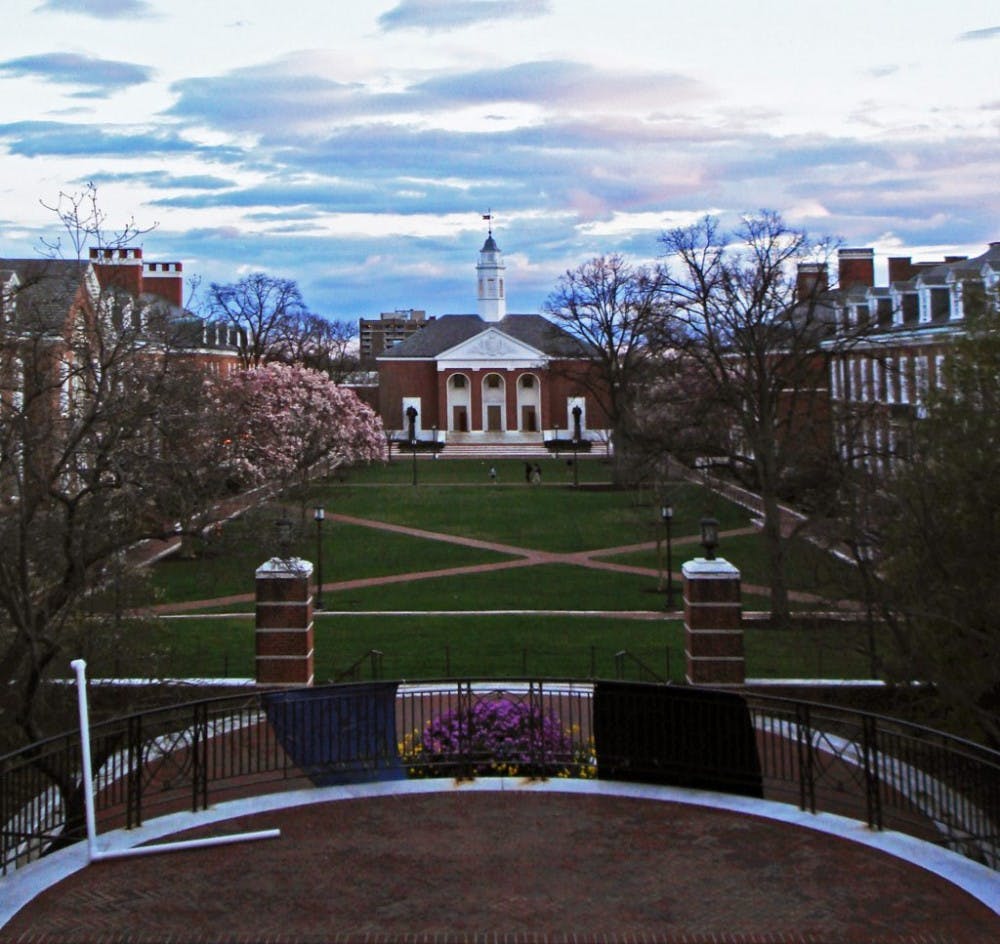Ever take a campus tour? Even if you haven’t, you know what it’s like: your friends walking backwards, cutting quickly through Brody while ignoring the palpable malaise, telling you how many student-run groups there are — more than 400! It turns out that 20 hours per week on B-level isn’t too attractive to 11th graders, but the chance to lead monthly canoeing trips or work on the largest student-run fair in the country might be.
This is more than just a strategy used by overworked tour guides to gussy Hopkins up. It’s an attitude that shapes school policy. Among University President Ronald J. Daniels’ top priorities, outlined in the latest of his glitzily named strategic plans, is to “Build Johns Hopkins’ undergraduate experience so it stands among the top ten in the nation.”
The generalization, “experience,” is operative here; After all, U.S. News & World Report takes a holistic approach to its rankings. So Hopkins, despite its reputation as an academic powerhouse, loves to brag about its perks.
Unfortunately, the school’s investments in those perks often wind up making the University worse. This is because it has fallen into a dangerous trap, that of over-administration. Take, for example, student life outside of academics.
Reporting by The News-Letter found that 10 percent of the University’s budget is spent funding Homewood Student Affairs (HSA). But what does the school have to show for that $57 million investment?
You might try asking the Milton S. Eisenhower Symposium (MSE) (of which I was co-chairperson last semester) or the Foreign Affairs Symposium (FAS). After the student executives of these two groups had secured Senator Bernie Sanders as a speaker, HSA waded into their operations.
Associate Dean of Student Engagement Tiffany Sanchez insisted that MSE and FAS compromise their first-come, first-serve ethos and require that every attendee have a ticket. The Deans naturally stipulated that the tickets had to be purchased on the school’s proprietary ticketing system, causing a boondoggle with which the reader is surely familiar.
Or you might ask the Hopkins Organization for Programming (the HOP), which, thanks to HSA’s new branding policy implemented by Director of Student Leadership and Involvement Kirsten Fricke, may be forced to sacrifice its acronym or change its name. Or ask Spring Fair, which, just weeks away from the fair itself, has jockeyed with administrators over the location of its food quad. Or ask Johns Hopkins European Horizons, or the Johns Hopkins Jail Tutorial Project, or any student group with “Hopkins” in its name.
I don’t speak for any of these organizations. But I know firsthand the challenge of running a student group, and I also know that this challenge is compounded when faraway administrators involve themselves. It’s public choice theory applied at the University level: Give bureaucrats power, and they’ll do anything to show their utility.
Hence the $57 million to mandate seat reservations and force the Johns Hopkins Outdoors Club (JHOC) to become the Outdoors Club at Johns Hopkins (OCJH): See, we streamlined the Brand, so we’re useful.
This is an important issue, because administrative bloat doesn’t just affect student life. Graduate student Arash Abazari says the near-closure of the Humanities Center by Dean of the Krieger School of Arts and Sciences Beverly Wendland suggests that at Hopkins, administrative interests even trump academic ones.
Never mind that the Humanities Center has a storied history; Forget its graduate students pursuing idiosyncratic but useful research; Ignore the necessity of a comparative literature program to the humanities. Faraway deans saw eliminating the Humanities Center as an opportunity. See, we cut costs, so we’re useful.
We students ought to care too, because we foot the bill. Political Science Professor Benjamin Ginsberg connects the rise in tuition costs at American universities to the rise in administrative expenditures. These deans are good at proving their use, so they’re good at keeping their jobs, and they’re good at expanding their departments. All of that goodness amounts to little more than mounds of debt.
This is a remarkable institution that does many things well. But its management of student affairs is not one of them, nor is its support of smaller academic pursuits. The point is not that anything needs to be done about student affairs or the Humanities Center. It is precisely the opposite.
Devolve power to the people most familiar with these endeavors. Students and faculty are the backbone of this school. Give them money, and get out of the way.
Theodore Kupfer is a senior philosophy major from Camp Hill, Pa.





